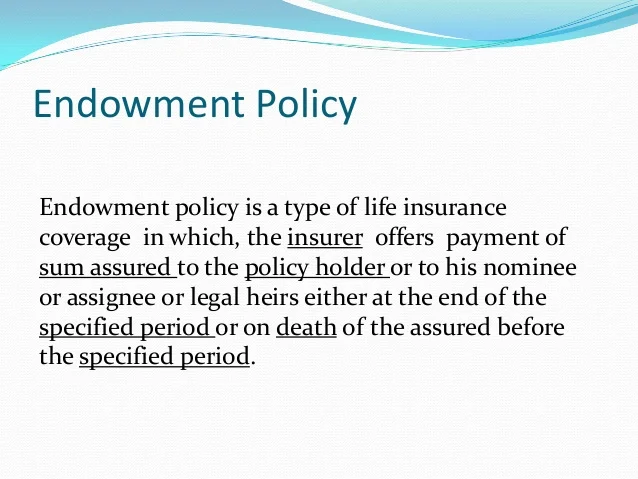What is an ‘Endowment Policy’?
What is an ‘Endowment Policy’?
An endowment policy is a combination of saving along with risk cover. This type of policy is specially designed to accumulate wealth and at the same time cover your life.
In this type of policy, the insured will pay a regular premium for a specific time period. And in case of death, the money will be paid to the beneficiary but, if you outlive the policy tenure, you will receive the sum assured along with accumulated bonus.
Basic Features of an endowment policy
An endowment policy is essentially a life insurance policy which, apart from covering the life of the insured, helps the policyholder save regularly over a specific period of time so that he/she is able to get a lump sum amount on the policy maturity in case he/she survives the policy term. This maturity amount can be used to meet various financial needs such as funding one's retirement, children's education and/or marriage or buying a house.
A life insurance endowment policy pays the full sum assured to the beneficiaries if the insured dies during the policy term or to the policyholder on the maturity of the policy if he/she survives the term.
Thus, "any life insurance plan with a saving component and lump sum maturity benefit can be termed as an endowment plan. That can be a unit linked insurance plan (ULIP) or a non-ULIP. However, in common parlance, only a non-ULIP saving-linked life insurance plan is referred to as an endowment plan," says Dr P Nandagopal, founder & chief mentor of financial services start-up OpenWorld Money.
Endowment plans, thus, fulfil the dual need for a life cover and savings under a single plan. They are one of the traditional forms of life insurance plans available in the Indian market.
Endowment policies are basically of two types - with profit and without profit. Within these two classes, there are many variations of endowment plans structured to meet the need of child education, whole life protection and pension, among others.
"The key benefits of an endowment plan include financial protection of loved ones, goal-based savings, tax benefits under section 80C and 10(10D) of the Income Tax Act and the options to obtain loan against the policy, in case of any financial emergency," says Rushabh Gandhi, director - sales & marketing, IndiaFirst Life Insurance.
A life insurance endowment policy pays the full sum assured to the beneficiaries if the insured dies during the policy term or to the policyholder on the maturity of the policy if he/she survives the term.
Thus, "any life insurance plan with a saving component and lump sum maturity benefit can be termed as an endowment plan. That can be a unit linked insurance plan (ULIP) or a non-ULIP. However, in common parlance, only a non-ULIP saving-linked life insurance plan is referred to as an endowment plan," says Dr P Nandagopal, founder & chief mentor of financial services start-up OpenWorld Money.
Endowment plans, thus, fulfil the dual need for a life cover and savings under a single plan. They are one of the traditional forms of life insurance plans available in the Indian market.
Endowment policies are basically of two types - with profit and without profit. Within these two classes, there are many variations of endowment plans structured to meet the need of child education, whole life protection and pension, among others.
"The key benefits of an endowment plan include financial protection of loved ones, goal-based savings, tax benefits under section 80C and 10(10D) of the Income Tax Act and the options to obtain loan against the policy, in case of any financial emergency," says Rushabh Gandhi, director - sales & marketing, IndiaFirst Life Insurance.


No comments: